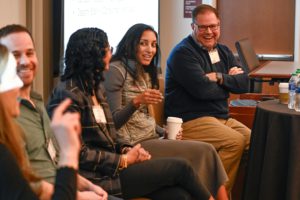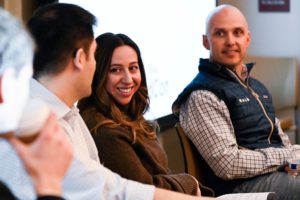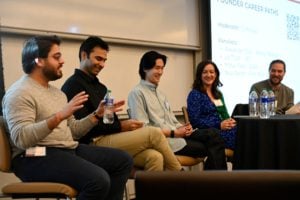Rattan L. Khosa SeedCon 2024: Innovating Amongst Giants in a Down Economy

Last week, the Polsky Center and Chicago Booth’s Entrepreneurship and Venture Capital (EVC) Group co-hosted Rattan L. Khosa SeedCon 2024, Booth’s annual flagship entrepreneurship and venture capital conference.
Through keynote fireside chats, panel discussions, and various networking sessions, SeedCon provides opportunities for entrepreneurs, investors, and passionate members of the startup ecosystem to explore emerging industry themes and connect over shared ideas. Nearly 200 attendees had the opportunity to hear from more than 40 speakers.
This year’s theme, Innovating Amongst Giants in a Down Economy, focused on helping entrepreneurs, investors, and operators explore how startups can unlock solutions for the future in the face of large tech giants.
Rattan L. Khosa, ’79, the namesake of the event and founder of industry-leading post-tensioning company AMSYSCO, offered opening remarks, and Coco Meers, MBA ’14, cofounder and CEO of Equilibria, a 360-wellness platform bringing balance to women through data-driven, personalized nutraceutical routines and 1:1 support, was the keynote speaker.
In his opening remarks, Khosa shared the story of his career, which started in India and eventually brought him to the United States with less than $4 in his pocket. After various jobs, he found himself in a spot of desperation and decided to start a company in his basement to put food on the table. Despite initially being called crazy, he successfully launched AMSYSCO and has since grown the company tremendously, turning a profit every year.
“I share my story, but it’s not really about me; it’s about what I can share that can inspire those looking to start a business,” said Khosa. “I have failed many times in my career, I could have blamed somebody else or said that life isn’t fair, but rather than accepting failure, you have to stand up and try again. And that’s the purpose of this – I want to leave them with the message that if you have faith in yourself, you can do anything.”
Khosa also expressed the importance of reaching out to others to help you achieve your goals.
“You can’t succeed on your own. Reach out for help,” Khosa said.
State of Consumer Business
The State of Consumer Business panel, moderated by Mia Saini Duchnowski, featured two founders – Veena Krishnan of Daybird and Jordan Tepper of Apologue – and two venture capital representatives – Sonia Nagar of Pritzker Group VC and Jason Starr of Consumer Ventures.
The group provided both the perspectives of founders and investors on a number of consumer-focused topics. Differentiating your brand was a recurring theme throughout the discussion, with both investors and founders touching on its importance.

State of Consumer Business Panel
“We looked at the beauty industry and saw that traditional messaging was all about adding more steps, and spending more time and money, leading to emotional frustration and many customers feeling disconnected from beauty standards,” said Krishnan. “We differentiate by focusing on simplifying your routine and minimizing steps, which would be antithetical to standard beauty industry messaging.”
“I look at three things when thinking about investing which can differentiate you – product, brand, and go-to-market,” said Nagar. “Your product should be unique or be in an underserved category; your brand storytelling should showcase who you are and your story; and your go-to-market should have some sort of special access to a community or have a viral coefficient.”
The group also discussed a topic on top of mind of many in the audience: How much money do you need to start a business from scratch?
“It depends a lot on your industry, some have a higher cost of entry, but as a general rule I would limit outside investment until you understand things like demand, manufacturing, and margins.” said Starr. “Start small, make products at home and sell locally such as at a farmer’s market. If you don’t have sales on an initial $500 or $1000 invested personally, then you should probably adjust your plans to raise capital.”
“$2 million is a really good number to aspire towards; I think raising less than $500,000 is going to make it very difficult,” said Tepper.
State of Fintech
The State of Fintech panel, moderated by Victor Lyonnet, visiting assistant professor of finance at Booth, kicked off with a discussion about the current economic environment, specifically the impact of interest rates and the difficult funding environment.
“The swings over the last five years have felt like whiplash – going from big investments, to cash is king, to a dry market. The things that you thought were good just a few years ago are no longer going to work for you,” said Hanane Bouchareb, vice president and head of operations at M1. “You need to have a mindset of flexibility and remove any ego. The market determines what you do, you don’t determine the market.”

State of Fintech Panel
Jason Barsema, cofounder and president of Halo Investing, agreed with the sentiment, and argued that the market should fall between the extremes.
“Startups don’t need to be spending like sailors like they were doing from 2018 to 2021, but they also don’t need to be as tight as they are right now,” said Barsema. “There is a point in the middle that we should probably be at, and I think the market will get there.”
Proposing a contradictory view, Cole Lundquist, MBA ’14, principal of QED Investors, expanded on the strange state of the current economic market for investors and founders.
“Most people feel like we’re in a recession, but if you look at the different indicators we’re actually in an up economy, it just doesn’t feel like it,” said Lundquist.
Founder Career Paths
Led by four founders in different stages of their entrepreneurial journey, the Founder Career Paths panel discussed the different challenges and wins that they’ve experienced throughout their careers.
Liz Tilatti, MBA ’13, fractional executive and EIR at 1871, shared a personal story of keeping everything in perspective.
“I was five months pregnant, working on my company, and was looking over my financial projections when I found the only way we would make it was if everything went absolutely right,” said Tilatti. “I knew in my gut it wasn’t going to happen, so I called my board member in tears and the first thing she said was ‘is the baby okay?’ I said of course and in response she said ‘then everything else will be ok.’ That really put it in perspective for me – you are so much more than your startup.”

Founder Career Paths Panel
Alexander Choi, co-founder and CEO of Natuur Brands, BA ’22, shared that aspiring entrepreneurs shouldn’t be scared just because they might not feel ready.
“I’m not sure if I was ever prepared to start my company, but I also don’t think anyone is ever fully prepared,” said Choi. “You don’t need to know everything about the industry before you start, you can learn a lot on the job. What’s most important is that you’re open to learning and quick to pivot.”
From an investor standpoint, Neal Sarraf, cofounder and board member of First Resonance, expressed the importance of trust between startup founders and investors.
“If I’m investing in a founder at the pre-seed stage, I’m investing in them as a person more than a company,” said Sarraf. “I want to spend time with each of them to understand what type of human they are. I invest with the intention to have a relationship for the rest of our lives. If their current project fails, that’s fine, I want to be involved in their next thing.”
Fireside Chat with Coco Meers
The day concluded with a fireside chat with Coco Meers, MBA ’14, CEO and co-founder of Equilibria, who shared her professional journey as a serial tech entrepreneur. After graduating from Princeton, Meers’ career took her to Paris where she helped market and manage global brands under the L’Oreal portfolio. Following that, she attended Booth, where she fell in love with entrepreneurship.

Coco Meers
“I met a second-year student who needed a marketer for her startup, and she brought me onboard as interim chief marketing officer,” said Meers. “It was my first experience in the early-stage startup world and I fell in love with it. I saw how passionate she was about her startup, and I wanted to feel that same passion for something.”
Meers started working on her first startup, PrettyQuick, which introduced major efficiencies to the $70 billion beauty services industry by offering seamless reservations at salons and spas nationwide. That startup saw success and was eventually acquired by Groupon in 2015.
Following the sale, she started investing in small companies which led to her current position as CEO and cofounder of Equilibria.
Throughout her journey, she’s learned a number of important lessons. But the most important one: fail.
“I’ve failed a lot in my career, but failure really is a good thing,” said Meers. “You just need to embrace it and learn from it.”